The Craig H. Neilsen Foundation is thrilled to continue the Craig H. Neilsen Visionary Prize with each prize winner awarded $1 million, respectively.
2023 Visionary Prize Recipients

Victor Calise
Victor Calise, a longtime disability advocate, is currently the Director of Walmart’s recently established Accessibility Center of Excellence in the Belonging, Diversity, Equity and Inclusion office. In 1992, at age 22, Victor was injured in a mountain biking accident, which left him paralyzed.
Prior to his time at Walmart, Victor spent over two decades in public service, culminating in his role as Commissioner of the New York City Mayor’s Office for People with Disabilities under three different Administrations from 2012 to 2022. Responsible for ensuring that New York City is the most accessible city in the world, Victor advised Mayor’s and agency partners on accessibility issues, spearheaded public-private partnerships, engaged in major infrastructure changes, implemented accessible taxis, and chaired the Accessibility Committee of the City’s Building Code.
Prior to working in New York City government, he was a disability advocate in the nonprofit sector. His leadership led to the creation of the NYC: ATWORK employment initiative—the city’s first public-private partnership that directly connects individuals with disabilities seeking employment and businesses with open roles. Victor also consistently engaged with innovators in digital accessibility, communications, and autonomous vehicle development to ensure that accessibility remained a priority in technological advancements. He has served in numerous leadership capacities and was appointed to the “New” New York panel, which examined the future of New York City and its economy.
Victor, an avid athlete, competed in the 1998 Paralympic Games in Nagano, Japan as a member of the first U.S. national sled hockey team. A native New Yorker, he lives on the Upper West Side with his wife, Susan, and two daughters.

Carmen Daniels Jones
Carmen Daniels Jones, based in Atlanta, Georgia, is the President/CEO, and founder of Solutions Marketing Group (SMG), a marketing consulting firm that develops data-driven strategies for organizations to market, serve, and employ people with disabilities. Carmen founded SMG in 1999. A car accident during her senior year of college resulted in paralysis. After the accident, Carmen decided to devote her career to uncovering opportunities for people with disabilities, who are often underserved and underestimated. Daniels Jones began her career at The Peninsula Center for Independent Living in Newport News, Virginia, where she worked with people with a range of disabilities.
Carmen advises companies on the viability and economic vitality of the disability market and positions them as inclusive industry leaders. She drives a passionate and informed conversation around the needs and desires of the disability community and provides informed solutions—one of strength, empowerment, and equality.
In her previous role at the U.S. Department of Agriculture (USDA), Carmen served as a political appointee of the Obama Administration advancing the President’s agenda to remove barriers for small businesses and socially disadvantaged farmers to access USDA’s services. Carmen has been responsible for helping companies access new markets, and she has worked with global brands, including AT&T, Bank of America, Darden Restaurants, JPMorgan Chase & Co, WellCare Health Plans, Blue Cross Blue Shield of Texas, the Inland Empire Health Plans, Zappos, Hilton, American Express, Sodexo, and ESPN. In March 2023, Carmen was appointed a member of President Biden’s Architectural and Transportation Barriers Compliance Access Board. She also serves on the boards of the United Spinal Association and the World Institute on Disability.
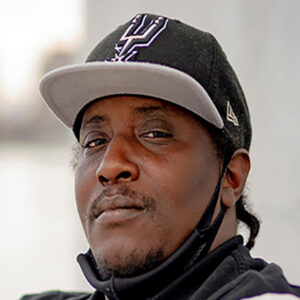
Vincent Pierce
Vincent Pierce, based in New York, is a music producer, gun violence survivor, and community organizer. He is co-director of the arts-and-justice initiative OPEN DOORS. As an OPEN DOORS Reality Poet, he has traveled around New York City sharing his story, poetry, and wisdom. As a teen, Vincent moved to North Carolina, where he studied music and played on multiple basketball teams. In his twenties, Vincent was shot while being robbed at gunpoint, leaving him paralyzed.
In 2019, Vincent began writing poetry after he was inspired by a writing workshop at Open Doors NYC. He started the music program ZING! which, he says, is “showing kids from neighborhoods like the one I grew up in that they are bigger than what their environments expect them to be.” Vincent’s poetry and writings have been published in Wheeling & Healing: A Poetry Anthology Edited by OPEN DOORS Reality Poets. He’s the recipient of a Center for Cultural Innovation Grant, which enabled him to start a music program aimed at keeping youth off the streets and in the studio.
In July 2020, Vincent launched #NursingHomeLivesMatter working for a healthcare system that protects, respects and cares for all those in long-term care, and for those who care for us.
2022 Visionary Prize Recipients

Josh Basile, Esq
Joshua Basile, Esq. is a DC-based attorney, Founder of Determined2Heal and SPINALpedia, and Community Relations Manager of accessiBe. Joshua decided to pursue a legal career to represent and fight for the catastrophically injured after suffering his own traumatic injury in 2004. Mr. Basile’s life changed forever during a family vacation when he suffered a severe spinal cord injury resulting in permanent paralysis. As a quadriplegic, he knows firsthand the daily struggles of the catastrophically injured and the importance of improving one’s quality of life.
After graduating magna cum laude from law school and passing the Maryland and District of Columbia bar, Mr. Basile joined Jack H. Olender & Associates. He also cofounded SPINALpedia.com – an online social mentoring network and video archive that allows the spinal cord community to motivate each other. SPINALpedia’s “Living with Adventurous Wheels” program organizes and sponsors adventures and sport outings for SCI families. Josh has personally mentored thousands of SCI families to help simplify the difficult transition into life with paralysis and to navigate disability employment benefits when pursuing and maintaining a job. In 2019, Mr. Basile was inducted into the National Disability Mentoring Coalition’s Susan Daniels Mentoring Hall of Fame.
His competitive attitude also continues outside his legal career. He is an inventor of both a device and a sport. He holds a patent for a golf device he created that allows those with physical limitations to putt a ball anywhere on a green or a miniature golf course. His putting device is used in Slingshot Golf, the sport he created, which allows players of all abilities to play against each other. Josh is also one of the driving forces behind the fuelService app, which streamlines communication between drivers with disabilities and gas stations willing to assist with pumping.
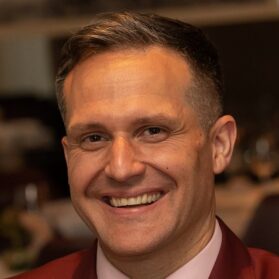
Yannick Benjamin
Yannick Benjamin, a lifelong New Yorker, was born to French immigrants. His father and uncles worked in fine dining, and by the age of 13, he knew he wanted to follow in their footsteps. By his mid-twenties, Yannick had worked in many of New York’s most prestigious restaurants and in 2003, he became a Certified Sommelier.
Weeks later, a car crash left Yannick paralyzed from the waist down and forced him to reinvent his career. For over a decade, he worked at Le Du’s Wines before becoming the Head Sommelier at the University Club.
In 2021, Yannick and his partner George Gallego, also a paraplegic, opened Contento, a disability-friendly restaurant in East Harlem inspired by Peruvian cuisine. Early reviews were glowing and Contento was a regional winner for Fine Wine’s 2022 Wine List Awards (North America) and added to Michelin’s New York City restaurant guide. In 2016, The Wine Enthusiast named Yannick one of their “40 Under 40,” and in 2021, he won the Sommelier/Beverage Director of the Year at the Wine Star Awards, as well as the VinePair Wine Professional of the Year. Most recently, Yannick made Food and Wine’s 2022 list of “Game Changers” and he is currently an Advanced Sommelier with the Court of Master Sommeliers. In November 2022, Yannick launched Beaupierre Wines & Spirits, a retail and gathering space, in Hell’s Kitchen, New York.
Always athletic, Yannick is an accomplished para-athlete, who has competed in 10 NYC marathons, and the Boston and Chicago marathons. Yannick’s indomitable spirit and infectious enthusiasm have inspired sommeliers, wine distributors, and winemakers to support his Wine on Wheels initiative, which gives back to the spinal cord injury community.
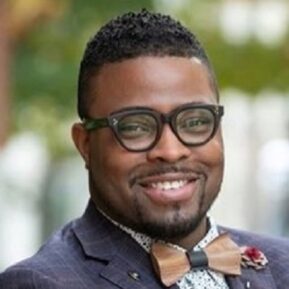
Dr. Oluwaferanmi ``Feranmi`` Okanlami, MS
Dr. Oluwaferanmi “Feranmi” Okanlami is an Assistant Professor of Family Medicine with a joint appointment in the Department of Physical Medicine and Rehabilitation at the University of Michigan. He serves as the Director for Medical Student Success in the Office for Health Equity and Inclusion and in 2021, was named the Director of Student Accessibility and Accommodation Services. Born in Nigeria before immigrating to the US at a young age, Dr. Okanlami earned a master’s degree in Engineering, Science, and Technology Entrepreneurship from The University of Notre Dame, and completed his Family Medicine Residency at Memorial Hospital in South Bend, Indiana. Feranmi received his MD from the University of Michigan before matching into Yale University’s Orthopedic Surgery Residency Program.
At the beginning of his third year at Yale, he suffered a spinal cord injury, paralyzing him from the chest down. After two surgeries and intense rehabilitation, he regained some return of motor function.
Nationally, Dr. Okanlami serves as the Disability Issues representative on the Steering Committee for the Group on Diversity and Inclusion at the Association of American Medical Colleges, while sitting on the National Medical Association’s Council on Medical Legislation. He was also selected by the White House Office of Public Engagement to participate in the Health Equity Leaders Roundtable Series and honored with one of Michiana’s 2017 Forty under 40 awards.
Dr. O, as he is affectionately known, has a catchphrase “Disabusing Disability” which he uses to demonstrate that DISability doesn’t necessarily mean INability, and serves the goal of creating a health system that is both inclusive and accessible for all. In 2020, he stepped up as the faculty lead for the COVID-19 hotline for the University of Michigan and was appointed to the COVID Campus Response Committee. He also serves on the Council for Medical Legislation at the National Medical Association.
2021 Visionary Prize Recipients
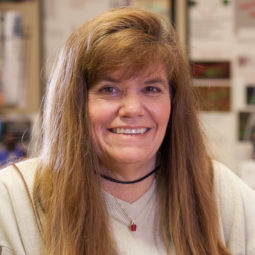
Kim Anderson-Erisman, PhD
Kim Anderson-Erisman, PhD, is the Director of the Northeast Ohio Regional SCI Model System based at the MetroHealth Rehabilitation Institute. She is a Professor in the Department of Physical Medicine and Rehabilitation at the MetroHealth Medical Center and Case Western Reserve University (CWRU) School of Medicine. Her research has focused on translational investigations and bridging the gap between basic science, clinical science, and the public community living with spinal cord injury (SCI). Dr. Anderson-Erisman is a founding member and serves as the President of the North American Spinal Cord Injury Consortium (NASCIC), a consumer advocacy group.
Her training spans the spectrum of SCI research, from cellular and molecular studies to whole animal and behavioral studies, to human clinical research. Having lived with cervical SCI for over 32 years, she has leveraged her lived experience to help guide research to be more relevant to the broader population living with SCI. Several of her studies have focused on obtaining the perspective of people living with SCI on various aspects of research, including functional priorities, acceptable benefits and risks, preferences for neuroprosthetics, and exercise participation. She has expertise in SCI outcome measures and has conducted a multi-center clinical study evaluating the reliability and validity of the Spinal Cord Independence Measure in the US healthcare setting, which is now the outcome measure for global function used in clinical trials. In addition to pursuing her own research regarding chronic injury, she was part of the leadership team running the 6 FDA-regulated Schwann cell transplantation clinical trials while a faculty member at the University of Miami. At MetroHealth-CWRU she is continuing her leadership in clinical trials of new interventions for SCI and further developing her independent research efforts addressing issues important to people living with SCI, with an emphasis on translational research to deploy treatments to the clinic and to the community.
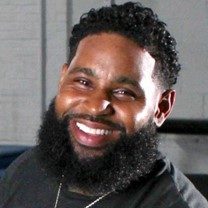
Wesley Hamilton
Wesley Hamilton is the Founder and CEO of Disabled But Not Really (DBNR), a non-profit with a mission to instill in the underserved “disabled” community, a physically limitless mindset that breeds courage, confidence, and competence. He aims to create an environment where anyone that is limited by circumstances beyond their control has a safe and inspiring place for growth. He accomplishes this through a focus on community engagement events with an emphasis on nutrition, fitness, and lifestyle, promoting a healthy and independent way of living. DBNR also partners with other community events to raise awareness about the role of good mental and physical health in overcoming life’s challenges. A scholarship program was created for individuals to have ongoing access to nutrition and fitness classes. DBNR also supports Kansas City’s homeless population, providing dignity care packages, water, and food.
Wesley was featured in Season 4 of the Netflix show Queer Eye where he sat with the man who shot him for a conversation. He says that the show “taught me how to be true to myself, and I was humbled by the experience.” Wesley has played an important role representing the Tommy Hilfiger Adaptive Clothing Line. With over 130,000 social media followers, Wesley is helping to raise the expectations for a broader range of products that are specifically designed for individuals with disabilities and is forcing other companies to take notice.

Alice Sheppard
Alice Sheppard is an internationally recognized dancer, choreographer, and founder of the disability arts ensemble Kinetic Light. She studied ballet and modern dance with Kitty Lunn and started her career performing with Infinity Dance Theater and AXIS Dance Company.
As Bessie award-winning choreographer, Sheppard creates movement that challenges conventional understandings of disabled and dancing bodies. In 2016, Alice founded Kinetic Light, a disability arts ensemble featuring herself, Jerron Herman, Laurel Lawson and Michael Maag. Working in the disciplines of art, technology, design, and dance, Kinetic Light creates, performs, and teaches at the nexus of access, queerness, disability, dance, and race. In the company’s work, intersectional disability is an aesthetic, a culture, and an essential element of artistry.
In addition to performance and choreography, Sheppard is a sought-after speaker and has lectured on topics related to disability arts, race, and dance. Her writing has appeared in The New York Times, academic journals, and the anthology Disability Visibility, edited by Alice Wong.
2020 Visionary Prize Recipients
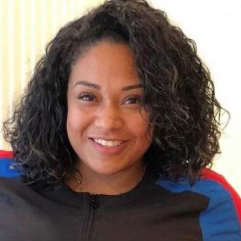
Andrea Dalzell, BSN, RN
Andrea Dalzell, BSN, RN, has been on the frontlines of the COVID-19 crisis as a registered nurse in New York City, and is one of only a few wheelchair-using nurses in the country. She became a nurse in 2018, even learning to box in order to build up the strength to administer CPR. Dalzell was recently featured in the Raw Beauty Project, a New York arts project celebrating women with disabilities and educating viewers to redefine perceptions and beauty. She has been featured in Apple Watch commercials demonstrating some of the device’s accessibility features. Dalzell received her undergraduate degree in Neuroscience and Biology, as well as her nursing degree, at the CUNY College of Staten Island, where she was awarded CUNY’s Emerging Leader of the Year Award. She also won the Cindy Loo Disability Rights Advocate Award in 2015 and was crowned Ms. Wheelchair New York in 2015.

Brian K. Kwon, MD, PhD, FRCSC
Brian K. Kwon, MD, PhD, FRCSC, has made several landmark contributions to SCI treatment and rehabilitation in his dual role as an attending orthopedic spine surgeon at Vancouver General Hospital (VGH) and a scientific researcher at the International Collaboration on Repair Discoveries (ICORD), University of British Columbia in Vancouver, BC, Canada. Dr. Kwon has sought to bridge the gap between scientific discovery and clinical practice with translational research studies that are truly relevant to people with SCI. These include studies of how blood pressure management could be optimized to enhance recovery after SCI and how the biological responses to injury can be used to identify new targets for treatment. Additionally, Dr. Kwon has established a biobank to share valuable SCI tissue specimens with other scientists in an effort to help the international research community move forward faster in the search for new therapies. This reflects the spirit of global collaboration central to Dr. Kwon’s research program, which has been recognized with awards such as the Turnbull-Tator Award in SCI Research and the Apple Award for excellence in publishing in SCI rehabilitation literature. As the Canada Research Chair in Spinal Cord Injury and the Dvorak Chair in Spine Trauma, Dr. Kwon currently serves as the Associate Director of Clinical Research for ICORD and the Chair of the AOSpine Knowledge Forum in Spinal Cord Injury.
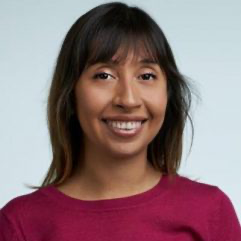
Reveca Torres
Reveca Torres is an artist and nonprofit director in Chicago. In 2009, she founded BACKBONES, a nonprofit organization that connects people with SCI to their communities. Through her work with BACKBONES, Torres has proven that activities like yoga, photography, theatre, and fashion design can be made accessible to people of all abilities with the proper support from peers and institutions. Torres is also the co-director of ReelAbilities Film Festival Chicago and has curated touring photography and art exhibitions that showcase the work of people with disabilities and bring awareness to disability rights. Torres uses painting, illustration, photography, film, movement, and other media as a form of expression as a tool for advocacy and social justice. She was also named New Mobility’s 2015 Person of the Year.